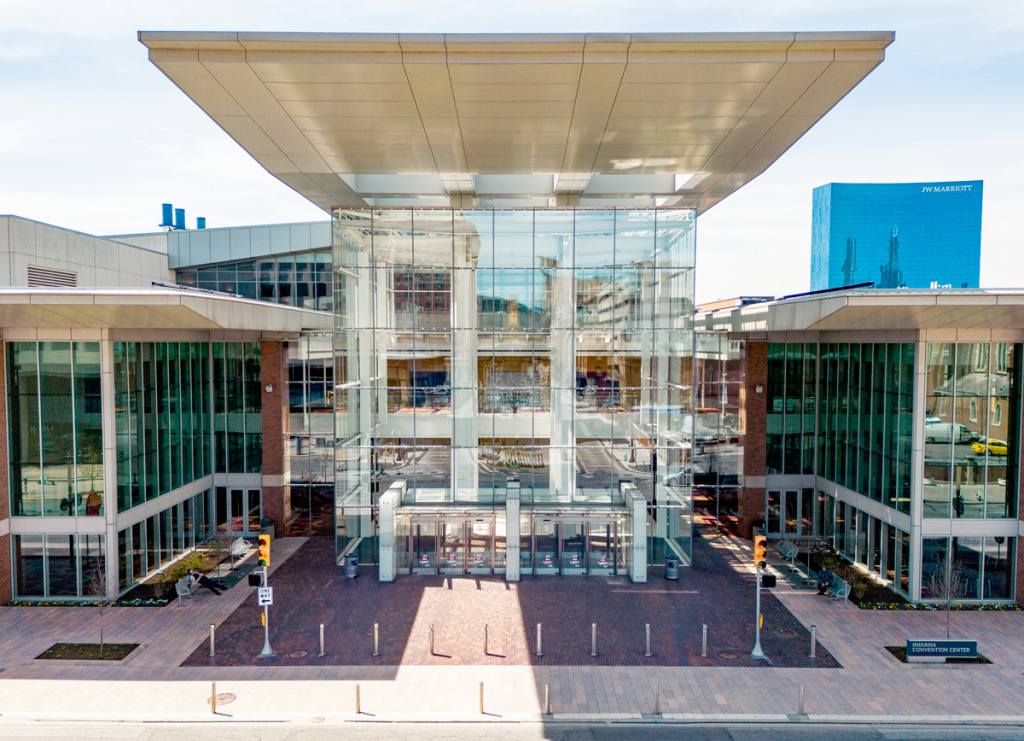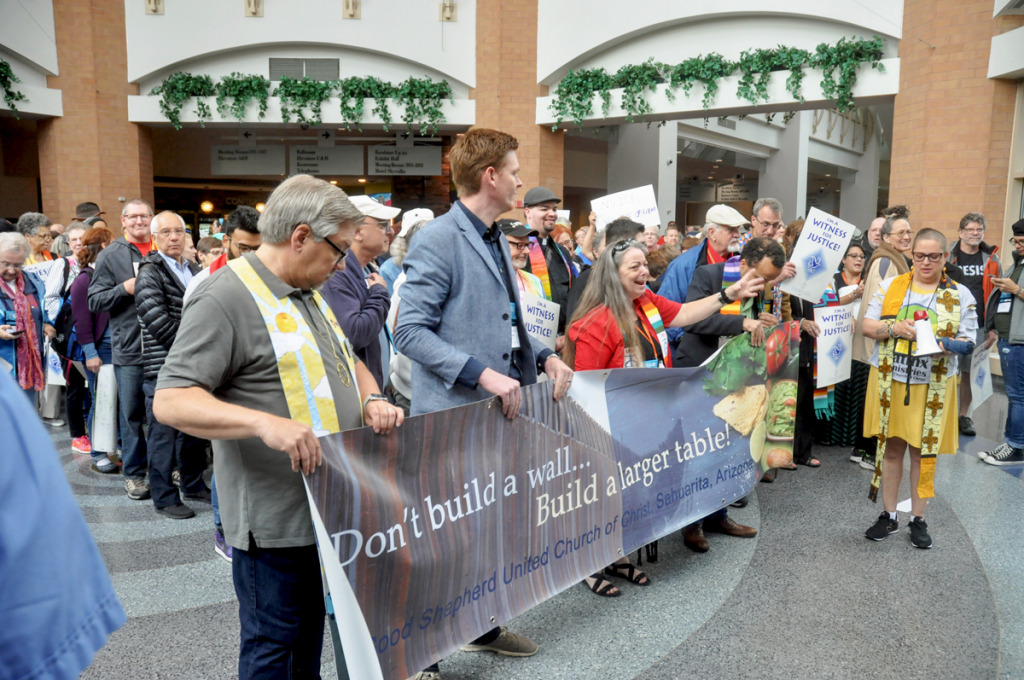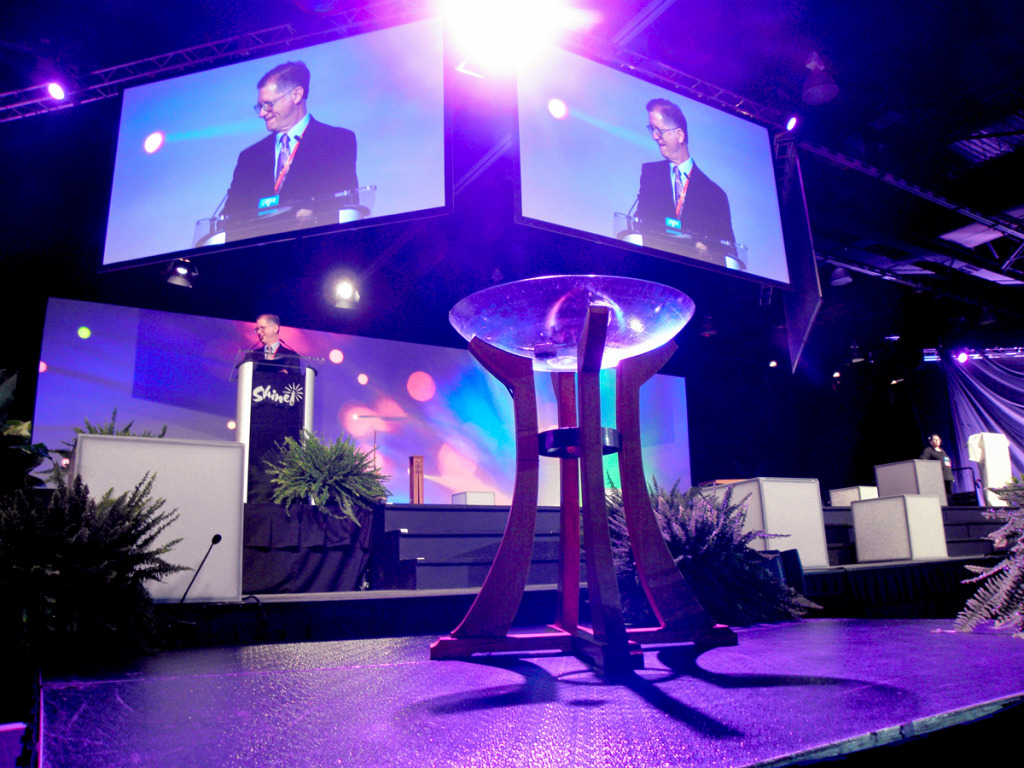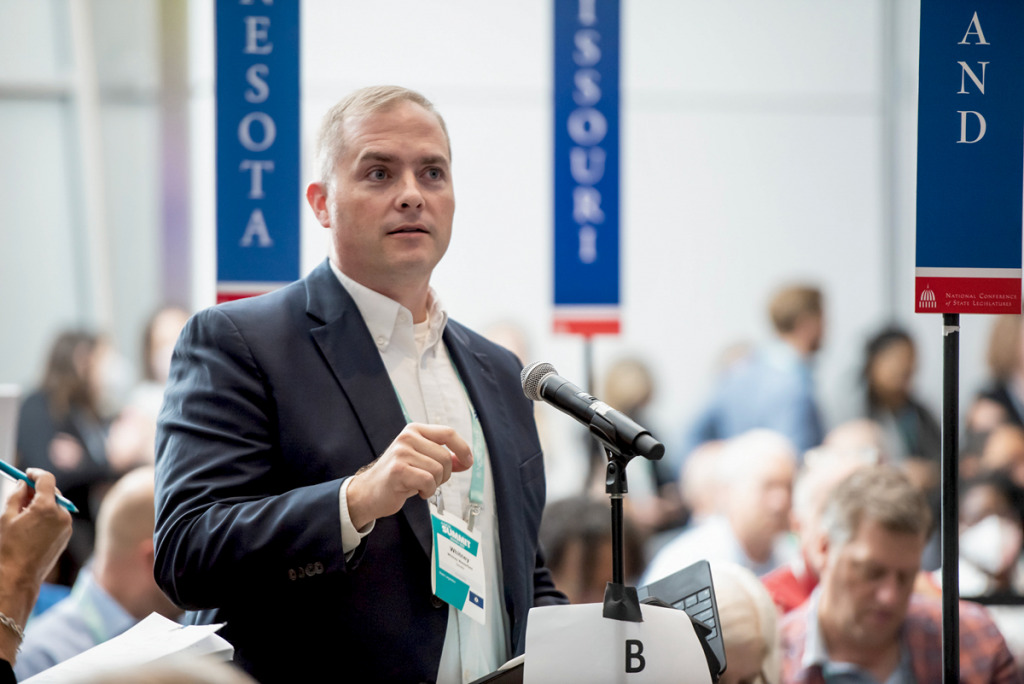Subscriber Benefit
As a subscriber you can listen to articles at work, in the car, or while you work out. Subscribe NowHosting conventions in Indianapolis is no small feat for locally based groups tapped to help their national organizations pull off the massive gatherings. Dozens, sometimes hundreds, of local volunteers do everything from registering guests to securing child care to finding dynamic off-site experiences.
But the role is worth it, local organizers say, because it brings their groups more public visibility and creates stronger unity among members.
Groups as diverse as religious denominations, state lawmakers, humanities not-for-profits and others are now gearing up to make sure hundreds, even thousands, of members have productive and gratifying visits to Indianapolis over the next several months. These local organizers typically work years in advance with national counterparts to try to ensure conventions go off without a hitch.
United Church of Christ

“It certainly has its challenges,” said Rev. Chad Abbott, conference minister of the Indianapolis-based Indiana-Kentucky United Church of Christ. The conference is hosting the national United Church of Christ Biennial General Synod at the Indiana Convention Center from June 30 to July 4.
The group is lining up 300 to 400 local volunteers to handle on-site registration, greet guests at Indianapolis International Airport and four hotels, and help at special events and general sessions.
“We’re excited about being the host,” Abbott said. “It’s an honor and an opportunity to offer hospitality to the rest of the church. You know going into this that it’s going to take a lot of people and time.”
About 900 delegates from its 34 conferences across the U.S. are expected, as well as national staff, ecumenical and global staff and visitors totaling 2,000 to 3,000 people. The Indiana-Kentucky UCC Conference has hosted the national event just one other time, in 1979.
Abbott stressed that hosting the synod energizes and brings together many UCC people, including four task forces focusing on hospitality, volunteer recruitment, worship and youth, and a local arrangements committee. The Indiana-Kentucky Conference also is in charge of child care and children’s programming and dealing with post-COVID protocols and accessibility.
“There’s a lot of team-building and community-building going into it,” he said. “This also allows us to see there is something much bigger than ourselves. We have 122 congregations [in Indiana-Kentucky], and most have not had much experience with the wider UCC. We are coming together for a wider purpose.”
The conference participants conduct the church’s organizational business; pass resolutions about societal issues, such as the death penalty and reproductive rights; and listen to speeches.
Part of the larger purpose, Abbott said, is to provide opportunities for “public witness.” Those can be prayer vigils to draw attention to social-justice issues, or social-action projects to engage the community. Two fundraising dinners will feature speakers Brian Stevenson, founder of the Equal Justice Initiative in Alabama, and Ibram Xolani Kendi, anti-racist activist, professor and founder of the Center for Antiracist Research at Boston University.
The UCC is among at least five major religious conventions that will be in Indianapolis this year. The largest will be the Church of the Nazarene General Assembly, which is expected to draw about 10,000 attendees June 9-15.
While the UCC is among national organizations calling on local affiliates to help host a convention, this arrangement is not always the case, said a spokesperson for Visit Indy, the not-for-profit sales and marketing arm for the city and the Indiana Convention Center.
Some national organizations prefer to have staff on location. A few major groups that regularly meet here are headquartered in Indiana, including Do it Best Corp. and the FFA. However, most planners do not live here, and many rely on Visit Indy to be their boots on the ground.
That’s a growing need, too, as the number of conventions and events in Indianapolis in 2023 is pacing 18% higher than in 2022, when 558 were hosted here, according to Visit Indy. Indianapolis is on schedule to host only 4% fewer groups than in 2019, pre-pandemic.
Organizations’ needs, whether met by Visit Indy or by their local affiliates, can be broad, extensive and, well, a little out of the ordinary. Visit Indy has been asked to come up with 100 yoga mats at the last minute and 50 umbrellas within an hour. It did.
Most often, though, organizations want help with location scouting for off-site events; finding local services, from transportation to ice sculptures; identifying local speakers; preparing community and local businesses for many visitors; and securing public safety, according to Visit Indy.
National Humanities Conference
Indiana Humanities, a statewide not-for-profit that funds and facilitates humanities programs encouraging Hoosiers to think, read and talk, is working now to fulfill needs for the National Humanities Conference Oct. 25-29 at the Indianapolis Marriott Downtown.
Visit Indy was instrumental in helping Indiana Humanities secure the conference in 2020 and reschedule it for 2023, after COVID-19 forced its cancellation, said Marisol Gouveia, Indiana Humanities director of engagement.

Indiana Humanities, one of 56 U.S. humanities councils nationwide, was selected as host in a bidding process by the national boards of the Federation of States Humanities Councils and the National Humanities Alliance. Gouveia said Indiana Humanities welcomed the chance to highlight its goals and work statewide, as well as to showcase other partners’ contributions to promote the humanities.
“We know the landscape and will provide on-the-ground support throughout the process,” she said. “Above all, we want to make sure everyone feels welcome in Indianapolis.”
All 12 Indiana Humanities staff members are involved in preparing for the event, which is expected to draw about 800 people, including humanities faculty and students, librarians, museum workers, historians, preservationists and others. They will be able to exchange ideas and best practices and find community with fellow public humanities practitioners, Gouveia said.
Indiana Humanities is lending several staffers to the overall planning committee, handling media relations, securing local financial conference partners, selecting off-site tours to see the humanities in action, creating a digital resource for places to eat and have fun, helping to select sites and speakers for opening and closing events not at the conference hotel, and recruiting volunteers, according to Gouveia.
“We want to showcase what is being done in Indiana and nationally,” she added, “and, in doing so, elevate our profile nationally and expose the public to what we are doing nationally.”
State legislatures
When state legislators from around the country converge on Indianapolis Aug. 11-16 for the National Conference of State Legislatures Legislative Summit, they, too, are going to be sharing ideas and coming up with actions they could take in their states.

The Indiana General Assembly, which was going to host the 2020 summit that also was canceled due to COVID-19, volunteered to host the summit this year to better educate legislators and staff members and brainstorm common problems, said Sen. Eric Bassler, R-Washington. He is an NCSL executive committee member and has helped with preparations.
The summit at the Indiana Convention Center is expected to attract 2,000 to 3,000 legislators from all 50 states and U.S. territories, plus legislative staff members, media and others interested in policy issues. Anyone can attend by paying the registration fee.
The Indiana Legislature as a whole isn’t involved in planning the summit, Bassler said. But Legislative Services Agency Deputy Executive Director Diane Powers has led the charge in preparations with a legislative planning group.
Part of the hosting duties include seeking donations from endowments and corporate sponsors to fund expenses that registration fees don’t cover, Bassler said. He and House Speaker Todd Huston, R-Fishers, began raising funds in 2018 when the initial summit was planned, he said, so that no taxpayer dollars are used. The bipartisan nature of the event helps attract corporate sponsors, he added.
“It truly is bipartisan in nature,” Bassler said. The president rotates back and forth between a Republican and Democrat, and committees are co-chaired by members of each party. Bassler said that’s a reason he supports this organization, along with its focus on solving “nuts and bolts” issues and not debating hot-button ones.
During the summit, panel discussions and educational sessions will be conducted on issues such as criminal justice, mental health, economic development, child welfare systems, higher education, and natural resources and infrastructure.
Hosting the summit is “definitely worth the time and effort,” he said. “We’re proud of Indiana and Indianapolis and think it’s a great place to have conventions. The geographic location in the middle of the country is easy to get to. We’re excited and looking forward to having a lot of people experience Indiana.”•
Please enable JavaScript to view this content.






Indy needs to up its game on convention business. Milwaukee hosting RNC and building huge expansion. Time for indy to stop being so conservative and really build boldy on its continuing success. Otherwise, cities like Milwaukee, which aren’t afraid to build big, will catch and surpass us. And Milwaukee has a lot more natural amenities to tout than indy. Get off your ars, indy. And we need a much more visionary mayor than hogsett.
Michael G.
Plus One1
Milwaukee is a great example. They’re going big and have built several new
towers in their downtown and are expanding their convention business.
Cincinnati and Nashville are expanding their downtowns and convention centers
also.
Meanwhile downtown Indianapolis is stagnating.
Where are the building cranes???
Go along Illinois and Meridian Streets from South Street up to the Circle
and it looks real bad –
– vacant store fronts
– Dirty stained sidewalks
– buildings looking old, unkept, and dingy from neglect
– not clean
– very little entertainment, no exhibits, very few restaurants.
If you’re an out of towner seeing this, would you want to come back??
If you’re a convention planner, would you select downtown Indianapolis
for your convention???
What happened to the expanded convention center and the convention
center Hilton hotel???
How about the city working with the Simon’s on building one big
signature building instead of two separate buildings. It would enhance our
skyline and give Simon’s a big beautiful signature building.
Last but not least, get rid of the panhandlers and vagrants. You get what
you tolerate.
We must be bold & visionary. We must get the private sector to lead.
To both Michael G and Keith B….I am sorry, but I don’t buy into your generalized assessments. Skyscrapers don’t make a city great or, for that matter, appealing to convention-goers. I’ll add, I am in that business and have traveled to virtually every convention city in the United States and Europe. Indianapolis is among the top.
I take nothing away from the great city of Milwaukee, having lived just south of there for many years and re-visited many times. They, like any major city, are doing what they can to re-generate their downtown and bring new life to their blighted areas. But with that said, they struggle with crime, too and not just any crime, but violent crime. Their violent crime rate is nearly 251% higher than the national average. Add to that, the crime is very centralized because Milwaukee covers just 96 square miles. meaning that the crime is isolated within those areas where visitors to the CITY would most like be. Indianapolis’ crime is problematic, for sure, but because of our government structure, Indianapolis covers all of Marion County (Unigov) and that is 4X the size of Milwaukee at 368 square miles.
The comment about restaurants is completely off-base but I want to be fair…Milwaukee has some outstanding restaurants, but Indianapolis does, too. And many (if not more) of the Indy restaurants are in close proximity to our Convention Center. Milwaukee has a way to go in that category.
Finally (and this may be the root of both of your comments), we live here and so we see our warts and our problems in a different light and, in many cases, on a regular basis. So that is not to say they don’t exist and that work needs to be done. But Indianapolis is an outstanding convention city and we continue to prove that on a regular basis. As much as it pained me to see the NRA Conference here last week (sorry, I hated for the country to see Indianapolis as the epicenter of that organization’s agenda), I applaud the city, the folks at Visit Indy and all the other organizations and businesses that continue to make Indianapolis a top spot for people to live, to visit and to return. Work to do? You bet…..but it won’t come from building more buildings….to your point Keith, let’s fill up the vacant space we have. Right?